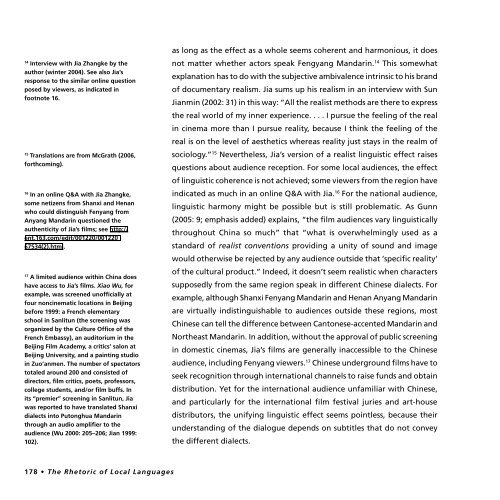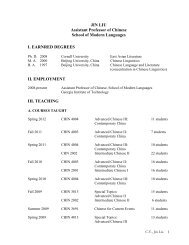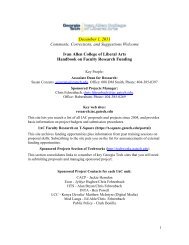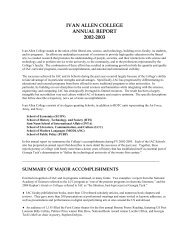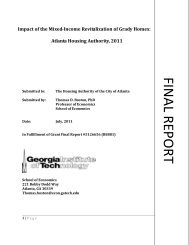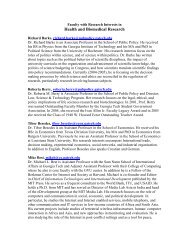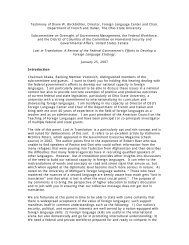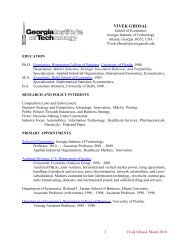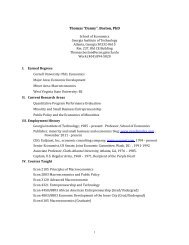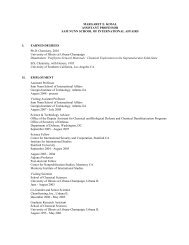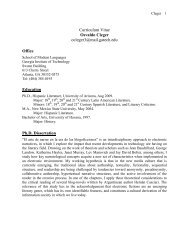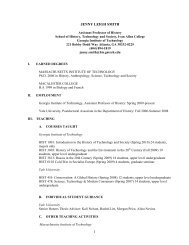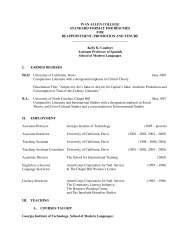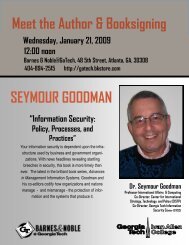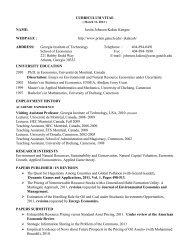Read this paper
Read this paper
Read this paper
You also want an ePaper? Increase the reach of your titles
YUMPU automatically turns print PDFs into web optimized ePapers that Google loves.
as long as the effect as a whole seems coherent and harmonious, it does<br />
14<br />
Interview with Jia Zhangke by the<br />
author (winter 2004). See also Jia’s<br />
response to the similar online question<br />
posed by viewers, as indicated in<br />
footnote 16.<br />
15<br />
Translations are from McGrath (2006,<br />
forthcoming).<br />
16<br />
In an online Q&A with Jia Zhangke,<br />
some netizens from Shanxi and Henan<br />
who could distinguish Fenyang from<br />
Anyang Mandarin questioned the<br />
authenticity of Jia’s films; see http://<br />
ent.163.com/edit/001220/001220_<br />
67534(2).html.<br />
17<br />
A limited audience within China does<br />
have access to Jia’s films. Xiao Wu, for<br />
example, was screened unofficially at<br />
four noncinematic locations in Beijing<br />
before 1999: a French elementary<br />
school in Sanlitun (the screening was<br />
organized by the Culture Office of the<br />
French Embassy), an auditorium in the<br />
Beijing Film Academy, a critics’ salon at<br />
Beijing University, and a painting studio<br />
in Zuo’anmen. The number of spectators<br />
totaled around 200 and consisted of<br />
directors, film critics, poets, professors,<br />
college students, and/or film buffs. In<br />
its “premier” screening in Sanlitun, Jia<br />
was reported to have translated Shanxi<br />
dialects into Putonghua Mandarin<br />
through an audio amplifier to the<br />
audience (Wu 2000: 205–206; Jian 1999:<br />
102).<br />
not matter whether actors speak Fengyang Mandarin. 14 This somewhat<br />
explanation has to do with the subjective ambivalence intrinsic to his brand<br />
of documentary realism. Jia sums up his realism in an interview with Sun<br />
Jianmin (2002: 31) in <strong>this</strong> way: “All the realist methods are there to express<br />
the real world of my inner experience. . . . I pursue the feeling of the real<br />
in cinema more than I pursue reality, because I think the feeling of the<br />
real is on the level of aesthetics whereas reality just stays in the realm of<br />
sociology.” 15 Nevertheless, Jia’s version of a realist linguistic effect raises<br />
questions about audience reception. For some local audiences, the effect<br />
of linguistic coherence is not achieved; some viewers from the region have<br />
indicated as much in an online Q&A with Jia. 16 For the national audience,<br />
linguistic harmony might be possible but is still problematic. As Gunn<br />
(2005: 9; emphasis added) explains, “the film audiences vary linguistically<br />
throughout China so much” that “what is overwhelmingly used as a<br />
standard of realist conventions providing a unity of sound and image<br />
would otherwise be rejected by any audience outside that ‘specific reality’<br />
of the cultural product.” Indeed, it doesn’t seem realistic when characters<br />
supposedly from the same region speak in different Chinese dialects. For<br />
example, although Shanxi Fenyang Mandarin and Henan Anyang Mandarin<br />
are virtually indistinguishable to audiences outside these regions, most<br />
Chinese can tell the difference between Cantonese-accented Mandarin and<br />
Northeast Mandarin. In addition, without the approval of public screening<br />
in domestic cinemas, Jia’s films are generally inaccessible to the Chinese<br />
audience, including Fenyang viewers. 17 Chinese underground films have to<br />
seek recognition through international channels to raise funds and obtain<br />
distribution. Yet for the international audience unfamiliar with Chinese,<br />
and particularly for the international film festival juries and art-house<br />
distributors, the unifying linguistic effect seems pointless, because their<br />
understanding of the dialogue depends on subtitles that do not convey<br />
the different dialects.<br />
178 • The Rhetoric of Local Languages<br />
MCLC 18.2.indd 178<br />
12/20/06 2:01:37 PM


